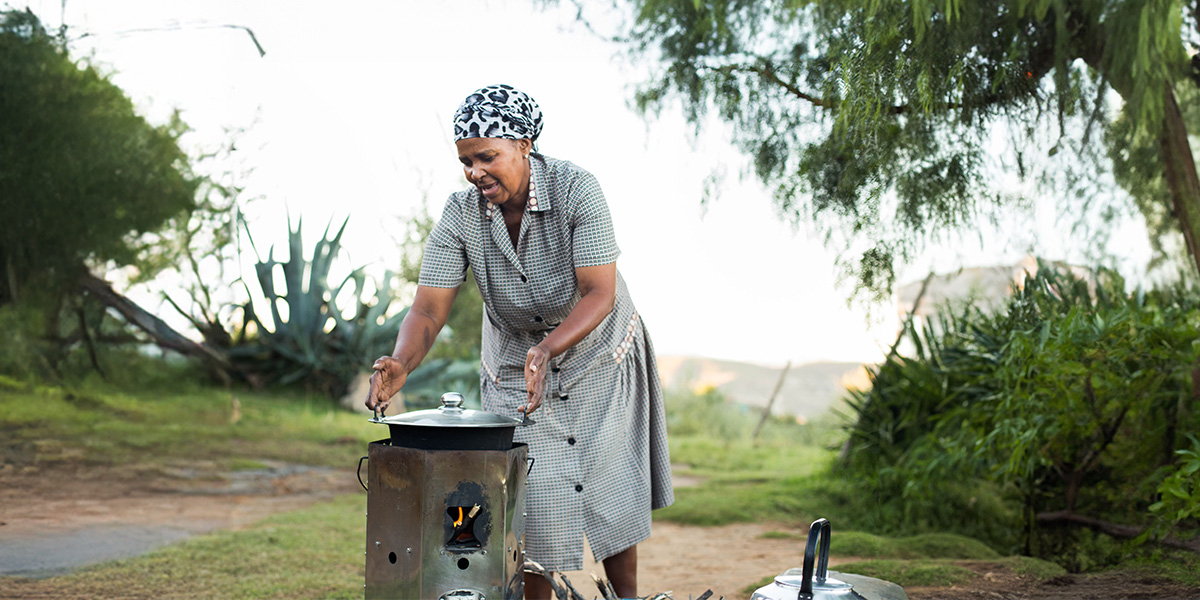
Cooking is an unpleasant task for some, a labor of love for others. For all people, however, it is a necessity. Across the globe today, 2.2 billion people live without access to clean cooking facilities, meaning that the tools they use to prepare meals are rudimentary at best, and that they often rely on dung or firewood to cook their food. These inefficient solid fuel sources can cause elevated levels of indoor pollution, leading to numerous diseases such as strokes, ischemic heart disease, chronic obstructive pulmonary disease and lung cancer. As an oil and gas producer, we know we have a role to play in expanding access to energy. Recognizing an opportunity for us to contribute, in 2022 we entered into a multiyear partnership with the Clean Cooking Alliance (CCA), an international nonprofit increasing accessibility to clean cooking for billions of people around the world.
“As a nonprofit leader and entrepreneur, being able to connect with other clean cooking innovators through programming facilitated by CCA has been essential,” said Lovans Owusu-Takyi, a Ghanaian business owner who founded Sustainable Energy Technologies (Setech) in 2019. “The solution to Africa’s energy access challenges can be discovered and implemented by African-manufactured clean cooking tools, which we have improved in the last few years.”
CCA is active in multiple African nations, supporting both seasoned and emerging entrepreneurs with financial networks and business workshops, to help them develop sustainable energy solutions and build pathways to economic resilience. In Africa, 93% of rural populations lack access to clean cooking fuels and technologies, and it is often women and children who are exposed to high levels of smoke inhalation, vision impairment and other health issues when relying on rudimentary wood- or dung-fueled stoves. Owusu-Takyi has taken this challenge head on, connecting rural mothers, wives and daughters to modern and clean cooking tools they so desperately need.
Since Setech’s founding, the company has sold more than 160,000 low-cost clean cooking stoves to people living in rural and periurban areas throughout Ghana. The primary challenge he and many other clean cooking entrepreneurs face is cost: although the stoves are sold for $15 to $18 each, most people living in rural areas cannot afford them, especially when firewood is freely available.
“What ends up happening is people like my grandmother, who really need the cook stoves, are struggling to afford them,” said Happy Amos, founder of Roshan Renewables, a Nigeria-based, women-led cookstove manufacturing company. “For people in rural communities who can just go cut down a tree and bring it back home at no cost, they still wonder what the point is of using improved cookstoves.”
Amos, who participated in the APA-supported venture accelerator last year, started her company in 2014 after tending to her sick grandmother, who lived in a remote village and was relying on a three-stone fire stove for warm meals. Amos had just graduated with a degree in business administration when she realized she had stumbled upon an idea that would not only help her grandmother, but many other families in rural Nigeria.
Both Amos and Owusu-Takyi have implemented savvy sales strategies to ensure these clean cook stoves reach their target market — and once a microbusiness owner or village matriarch tries the stove for the first time, they realize how much healthier and more efficient it is.
“I remember one woman telling me ‘My dear, just go, I have used this stone stove since before you were born,’” Amos said. “I asked her to at least use my clean cook stove for one week for her small bean cake business, and she agreed. A week later, I came back…I was standing there thinking she had not seen me yet, since she was counting her earnings. She turned around and instantly handed me the money for the cook stove, asking if I could bring her another one so she could sell more bean cakes to other people.”
In addition to using the “try-before-you-buy” sales strategy, Amos and Owusu-Takyi have worked to establish savings and loan groups for villages, with Amos particularly focusing on women.
Within Amos’ model, up to 25 women can collectively contribute funds on a periodic basis, which can then be loaned as needed, either for cook stoves or other needs. This acts as an empowering economic tool for people who may not otherwise have access to capital, enhancing purchasing power for communities that need it.
Owusu-Takyi, who has worked in the sustainability space in Africa for decades, believes locally manufactured cook stoves are one important piece of the affordability puzzle, since many tend to be imported into Ghana from the West. Partially subsidizing production costs via carbon financing is a solution he and Amos both hope for.
Another key aspiration is greater access to what is considered by locals to be the cooking-fuel gold standard: LPG.
“With LPG, you eliminate smoke, which immediately makes it a better option,” Owusu-Takyi said. “We need to make LPG more affordable, especially for rural communities. Although we are not there yet, companies in Ghana are introducing a pay-as-you-go model, so changes like this would be good to promote LPG at the local level.”
Looking ahead, both Amos and Owusu-Takyi expressed their desire for an energy expansion that would consider all forms of clean cooking solutions for a more sustainable African future. At CCA’s venture accelerator bootcamp last fall, where these entrepreneurs first met and began their journeys with CCA, Amos and Owusu-Takyi caught a glimpse of what that future could look like.
Oct. 2024